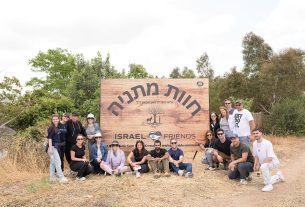As human beings, we are wired from birth for social connection.
We smile, coo in a higher pitched voice, and even nurse our young from a perfect focal length for optimal mother-infant bonding. With time and as we age, however, we have become increasingly more isolated and disconnected. This is especially true in our post-COVID world, and the concomitant and excessive use of social media has unfortunately only increased our sense of isolation and loneliness.
It is therefore not shocking to hear that the Office of the US Surgeon General has described loneliness as being more widespread than other major health issues and sees loneliness and isolation as a major public health concern. Yes, loneliness is more than just a bad feeling, and as individuals, a community, and a country, we all need to sit up and take notice. Sadly, I am not even referring to the current state of our nation, which in being so divided has only helped to greatly amplify our sense of loneliness and isolation. The sense of dis-ease at the moment is quite profound.
It is essential to distinguish between the terms “loneliness” and “alone.” Loneliness can be defined as a subjective feeling of sadness because of perceived lack of social connection – you can be solitary and have no friends or companionship, or the social network that you do have does not meet your expectations. Alone, on the other hand, means having no one else present. While it can lead to feelings of isolation, you do not have to feel this way. It’s isolation that needs to be addressed. While you can feel lonely even when you’re not alone, you can also be alone but not feel lonely. Preventing the feeling of loneliness is the goal for preventing social isolation.
It is a known fact that when people are socially disconnected, they are at higher risk for anxiety and depression, heart disease, stroke, and dementia, as well as substance abuse, premature death, and a host of other issues. While other issues such as poor health, chronic pain, losses such as the death of a loved one, loss of a job, retirement, and other life transitions compound the problem among the aging population, this is also a very serious issue in teens and young adults who are struggling with having lots of “friends” on social media but few in real life.
ON THE flip side, and this is truly key: Connectedness leads to decreased stress, better physical and mental health, increased happiness, greater resilience, and so much more.
We know, too, that our level of pain during a medical procedure is greatly reduced when someone does something as simple as hold our hand. Touch is very important, and yet so many people are feeling deprived of touch and physical connection along with social isolation.
How can we work to achieve connectedness?
It is so easy for all of us to neglect our friendships for other things that “seem” more important. How often have you said that you were too busy to make a call or reach out because of work, scrolling on social media, or feeling that you had no time, but if you were being honest with yourself, you were not really doing anything important? It is more vital than ever to prioritize relationships and invest in one another, as individuals and as a community. This may require finding ways to nurture relationships that may feel a bit worn from lack of energy or interest post-COVID. As such, this requires not only reaching out to others but also making yourself available to invest the time and effort to revitalize a relationship that has faded over time.
It is critical to internalize that in order to have a friend, you also need to be a friend. It is not enough to be physically present. You will need to be emotionally present and available as well.
You can feel lonely even when surrounded by others or within a marriage that from the outside “looks good.” You may know of or be living with someone with dementia or other issues that may mean that while physically present, they are emotionally absent. In this situation, you or someone else may desperately want nothing more than for someone to reach out.
You can have a huge impact on the health and well-being of your friends and your loved ones. A goal of great importance is not just to become a good listener but to work at becoming a great listener. As I say in my office, you are given two eyes and two ears, but only one mouth for a reason.
You need to find and make the time to reach out and be there for someone in a consistent way. This may mean writing in your calendar to call or send someone a birthday message or better still, invite someone for coffee. It doesn’t have to be a birthday but can be an “I was just thinking of you” call. If you haven’t seen someone in a while, reaching out shows you noticed their absence and you care. Last week, someone knew that I had been away and picked up a few groceries for me, while another person surprised me with a meal in my refrigerator. Can you imagine how amazing these acts of kindness felt after having been in transit for 24 hours?
Ask yourself, when was the last time someone reached out to you? Or, more importantly, when did you do something special for someone else, and what small gesture can you do for someone today? It can be as easy as offering to pick something up for someone if they don’t have a car or if it is hot outside. Or better yet, take someone with you when you shop. You can ask the bus driver or grocery store cashier how they are and really listen. You can offer the neighborhood street sweeper or a repair person something to drink. Likewise, saying a simple thank you can make them feel appreciated.
Volunteering, too, is a great antidote for loneliness. One of the best ways to feel good is to do something for someone else. It does not have to be something big or with more commitment than you are able to give. You can be a befriender to someone who is shut in, be a cuddler in the nursery, glean fields, work in a library, or tutor someone in English. The possibilities are endless. Giving to someone younger than you enables you to transmit intergenerational values and be a treasured role model. Studies where preschoolers and octogenarians interact have demonstrated a life-changing impact on anxiety, depression, and overall well-being. Helping someone older enables them to impart important life lessons and experiences to you. It is a win-win situation for everyone.
Be present. Nurture the relationships that you do have by investing your time and effort. Find a way to increase quality time with someone that is free from distraction. Make eye contact and put down your phone. Excessive social media can actually increase isolation. A screen won’t substitute for human connectedness, whereas getting outside in nature can heighten your senses and feel both calming and invigorating. Ask someone to join you for a walk.
Develop an attitude of gratitude and appreciation. Reset your expectations and notice the small positives. They are definitely there. By finding the positive in others, you will discover that you feel better about yourself. Do acts of kindness and ask yourself on a daily basis, “What nice thing did I do for someone today? What can I do that would be helpful for someone else? How can I reach out?”
Connect with people who may have different life experiences than you. You may be surprised by how much you can learn by listening to their stories. This may push you beyond your comfort zone, but that can be a good thing. It may be through an exercise or art class or even learning with a partner.
Think of forming a coffee meet-up friend support group or a group with others who share a common interest. As I have noted previously, my father-in-law was a founder of his ROMEO group – “retired old men eating out.” They met once a week for lunch and a good chat. Perhaps you want to play bridge or mah-jongg, take up pottery or art, join a knitting circle, cinema club, dog-walking group or become a baby cuddler. The list is endless and definitely beats sitting home in isolation. If you cannot go out, have others visit you or join a Zoom session. You don’t have to be lonely or alone.
Finally, if you are struggling or find social situations difficult or scary, please seek help. Talk to a mental health professional, your rabbi, or anyone else who may be able to help. You don’t have to do it alone.
The writer is a licensed clinical psychologist in private practice in Ra’anana, and author of Life’s Journey: Exploring Relationships – Resolving Conflicts. She has written about psychology in The Jerusalem Post since 2000. [email protected], www.drbatyaludman.com




